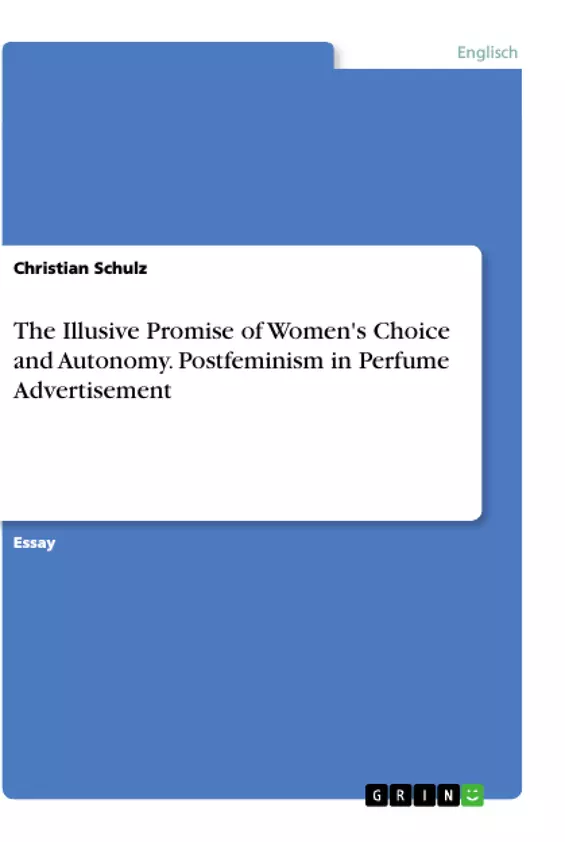Rosalind Gill connects the neoliberal consumer and the "active, freely choosing, self-reinventing subject of postfeminism" ("Postfeminist Media Culture" 164). In light of contemporary gender issues like 'Pink Tax' and equal pay, postfeminist or postmodern western media culture appears to play a major role by simultaneously constructing and dismantling the concept of the self-determined female individual.
In view of this significant change in the perception of consumerism, Gill defines "postfeminism", similar to the term postmodernism, as having "become overloaded with different meanings" ("Postfeminist Media Culture" 147). In contrast to the numerous contested understandings of postfeminist notions, Gill proposes that "postfeminism" is to be understood "as a sensibility that characterizes increasing numbers of films, television shows, advertisements and other media products" (148). Moving beyond the concept of sensibility, Gill ascribes postfeminism the ability to construct "an articulation or suture between feminist and anti-feminist ideas" (162). In order to pinpoint postfeminist media products, Gill provides us with a "number of interrelated themes" that accompany the rise of postfeminist media culture (147). For Gill, these include the display of "femininity as a bodily property" (149), the allusion of female sexual subjectivity (151), an emphasis on female "choice [,] empowerment" (153) and "self-surveillance" (155), as well as the use of the "makeover paradigm" (156) and "irony" (159).
These themes and their relatedness to postfeminist sensibility will be elaborated on here by using the example of a Roberto Cavalli perfume advertisement for women from 2012. In this perfume advert, a young and attractive woman wakes up from an afternoon nap in a lavishly furnished bedroom, puts on a dress and Roberto Cavalli necklace, and then makes her way through an Italian palace to an extravagant garden party. Her walk to the garden is continuously juxtaposed with a trotting tiger, who appears to be heading for the same direction. As the woman arrives at the palace garden, all eyes are focused on her. She approaches a man sitting in a luxurious chair and throws her necklace at him. Not until then is the perfume properly being introduced to the viewer alongside a read-out. In this essay, the author will argue that Roberto Cavalli's perfume advert reflects postfeminism.
Inhaltsverzeichnis
- The Illusive Promise of Women's Choice and Autonomy: Postfeminism in a Roberto Cavalli Perfume Advertisement
- Introduction
- Postfeminist Media Culture
- Postfeminist Sensibility and Roberto Cavalli's Perfume Advertisement
- The Representation of the Female Body
- Female Sexual Subjectivity
- Choice, Empowerment and Self-Surveillance
- The Makeover Paradigm
- Irony and Knowingness
- Conclusion
Zielsetzung und Themenschwerpunkte
Der Essay analysiert eine Parfumwerbung von Roberto Cavalli aus dem Jahr 2012, um zu demonstrieren, wie Postfeminismus in zeitgenössischer westlicher Medienkultur Frauenbilder konstruiert, die gleichzeitig von der Selbstbestimmung und der Notwendigkeit zur Selbstüberwachung sprechen.
- Postfeministische Medienkultur und ihre Eigenschaften
- Darstellung der weiblichen Figur und ihre Verbindung zu den Idealen der Schönheit
- Konstruktion der Frau als sexuelles Subjekt und der vermeintliche freie Wille zur Selbstdarstellung
- Die scheinbare Selbstbestimmung der Frau durch Konsum und die Rolle des Makeover-Paradigmas
- Ironie und die Ambivalenz der Botschaft der Werbung
Zusammenfassung der Kapitel
- Der Essay beginnt mit einer Einleitung, die den Postfeminismus als einflussreiches Phänomen in der westlichen Medienkultur einführt.
- Im Anschluss werden die wichtigsten Merkmale von Postfeminismus nach Rosalind Gill dargestellt, die als Grundlage für die Analyse der Roberto Cavalli-Werbung dienen.
- Die folgenden Kapitel untersuchen verschiedene Aspekte der Werbung, wie die Darstellung des weiblichen Körpers, die Konstruktion weiblicher sexueller Subjektivität, die vermeintliche Selbstbestimmung und die Verwendung des Makeover-Paradigmas.
- Ein eigenes Kapitel widmet sich der Rolle der Ironie in der Werbung und analysiert die Ambivalenz ihrer Botschaft.
Schlüsselwörter
Der Text befasst sich mit dem Postfeminismus als einem wichtigen kulturellen und medialen Phänomen, der die scheinbare Selbstbestimmung von Frauen mit der gleichzeitig bestehenden Notwendigkeit zur Selbstüberwachung und der Orientierung an konventionellen Schönheitsidealen in Verbindung bringt. Die Analyse untersucht die Rolle der Medien in der Konstruktion von Geschlechterrollen und beleuchtet die Bedeutung von Konsum, sexueller Subjektivität und Ironie in postfeministischen Medienprodukten.
Häufig gestellte Fragen
Was bedeutet Postfeminismus in der Medienkultur?
Ein Zustand, in dem feministische und antifeministische Ideen verschmelzen und Frauen als frei wählende, sich selbst optimierende Konsumentinnen dargestellt werden.
Wie wird der weibliche Körper in der Roberto Cavalli Werbung inszeniert?
Weiblichkeit wird als körperliches Eigentum dargestellt, das durch Schönheit und sexuelle Subjektivität Macht suggeriert.
Was ist das "Makeover-Paradigma"?
Die Vorstellung, dass Frauen sich durch Konsum und Pflege ständig neu erfinden müssen, um empowerment zu erfahren.
Welche Rolle spielt Ironie in postfeministischer Werbung?
Ironie dient dazu, kritische Einwände vorab zu entkräften, indem die Werbung signalisiert, dass sie ihre eigene Künstlichkeit kennt.
Warum wird von einer "illusorischen Versprechen" gesprochen?
Weil die scheinbare Wahlfreiheit der Frau oft mit einer verstärkten Selbstüberwachung und Anpassung an traditionelle Ideale einhergeht.
- Citation du texte
- Christian Schulz (Auteur), 2018, The Illusive Promise of Women's Choice and Autonomy. Postfeminism in Perfume Advertisement, Munich, GRIN Verlag, https://www.grin.com/document/703377



